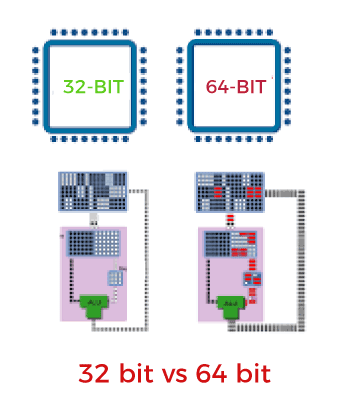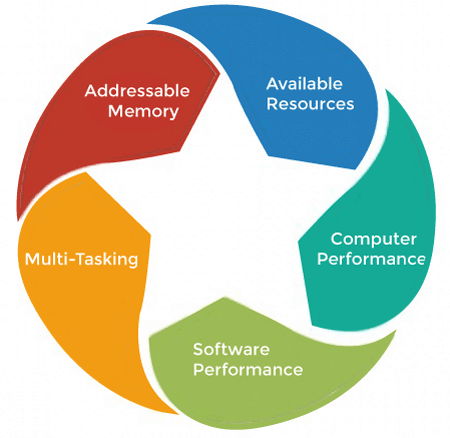Difference between 32 bit and 64 bit Operating System
In computing, a byte is the unit of data, and processing is generally denoted as bit processing. In general, there exist two types of processors, namely a 32-bit processor and a 64-bit processor. This type of processor tells us how much memory a processor can have access from a CPU register.

- A 32-bit system can access 232 memory addresses, i.e., 4 GB of RAM or physical memory; ideally, it can also access more than 4 GB of RAM.
- A 64-bit system can access 264 memory addresses, i.e., actually 18-Quintillion bytes of RAM. In short, any amount of memory greater than 4 GB can be easily handled by it.
With an increase in the availability of 64-bit processors and larger RAM capacities, Microsoft and Apple both have upgraded versions of their operating systems designed to take full advantage of the new technology. The first fully 64-bit operating system was Mac OS X Snow Leopard in 2009. Meanwhile, the first Smartphone with a 64-bit chip (Apple A7) was the iPhone 5s.
What is 32-Bit Operating System?
It is a CPU architecture type that holds the capacity to transfer 32 bits of data. It refers to the amount of data and information that your CPU can easily process when operating. A majority of the computers produced in the early 2000s and 1990s were 32-bit machines.
One bit in the register can typically reference an individual byte. Thus, the 32-bit system is capable of addressing about 4,294,967,296 bytes (4 GB) of RAM. Its actual limit is less than 3.5 GB (usually) because a portion of the register stores various other temporary values apart from the memory addresses.
What is 64-Bit Operating System?
The 64-bit microprocessor allows computer systems to process information, data, and memory addresses represented by 64 bits. Such a system can typically reference 16 exabytes (17,179,869,184 GB), or 18,446,744,073,709,551,616 bytes of memory.
A 64-bit system (a computer with a 64-bit processor) can access more than 4 GB of RAM. It is numerous million times more than what an average workstation would require to access. It means that if a computer has 8 GB of RAM, it requires a 64-bit processor. Or else, the CPU will be inaccessible to at least 4 GB of the memory.
Advantages of 64-bit over the 32-bit operating system
Below are the following advantages of a 64-bit operating system over the 32-bit operating system, such as:

- Addressable memory: 32-bit operating systems can address a maximum of 4 GB of RAM. But 64-bit operating system can address up to 17,179,869,184 GB (16 exabytes). That's a lot more than 4GB of memory that a 32-bit operating system can handle.
- Available Resources: The 64-bit operating system can make full use of available system resources compared to a 32-bit system. To simplify, installing more RAM on a system with a 32-bit OS doesn't impact performance. However, upgrade that system with excess RAM to the 64-bit version of Windows, and you'll notice a difference.
- Computer Performance: The system can perform more calculations per second using a 64-bit system with a 64-bit processer. As a result, it increases the processing power and makes a computer run faster. This is limited in the case of 32-bit operating systems.
- Software performance: More software's are written to leverage the benefit of a 64-bit operating system fully. If you are using a 64-bit operating system and install software of 64 bit, you can up-front notice the increase in performance. It becomes even more critical when performing a huge operation that requires the system to access more memory. An increase in software performance leads results in an increase in overall efficiency.
- Multitasking: Using 64-bit, users can do various things in multitasking at the same time. Users can easily switch between various applications without any windows hanging problems.
Difference between 32-bit and 64-bit OS
A 64-bit processor is more capable than a 32-bit processor because it can handle more data at once. A 64-bit processor can store more computational values, including memory addresses, which means it can access over 4 billion times the physical memory of a 32-bit processor.
Here is the key difference, 32-bit processors are perfectly capable of handling a limited amount of RAM (in Windows, 4GB or less), and 64-bit processors can utilize much more. A major difference between 32-bit processors and 64-bit processors is the number of calculations per second they can perform, which affects the speed at which they can complete tasks. Below are some more differences between 32-bit and 64-bit operating systems, such as:
| Parameters |
32-bit Processors |
64-bit Processors |
| Handling of Data and Storage |
As its name suggests, the 32 bit OS can store and handle lesser data than the 64 bit OS. More specifically, it addresses a maximum of 4,294,967,296 bytes (4 GB) of RAM. |
The 64 bit OS, on the other hand, can handle more data than the 32 bit OS. It means that it can address a total of 264 memory addresses, which is 18-Quintillion GB of RAM. |
| Architecture |
The 32-bit system has general computing, including IBM System/360 and IBM System/370, the DEC VAX, the Motorola 68000 Family, the Intel IA-32, and the 32-bit version of x86 architecture different versions. These are architectures that are used for embedded computing and include 68000 families. |
The registers are divided into different groups like integer, floating, control and often for addresses of various uses and names like address, index or base registers. The size of these registers is dependent on the amount of addressable memory. |
| Compatibility of System |
A 32-bit processor system could properly run a 32-bit OS, but it cannot run the 64-bit OS at its full capability. |
A 64-bit processor system can run either a 32-bit or 64-bit version of an installed operating system (OS). |
| Performance |
The factor of performance in a 32-bit processor is less efficient than the 64-bit processor. |
It exhibits a higher performance than the 32-bit processor. |
| Application Support |
The 64-bit programs and applications won't work. |
The 32-bit programs and applications will work with no hassle. |
| Addressable Space |
It has an addressable space of 4 GB. |
These have an addressable space of 16 GB. |
| Calculation per second |
32-bit systems have dual-core and quad-core versions available. |
64bit systems can come with dual-core, quad-core, six-core, and eight-core versions. Having these multiple cores available has increased its speed of calculations per second. |
| Multitasking Support |
The 32-bit system is not an ideal option for multitasking and stress-testing. |
For multitasking and stress testing, the 64-bit processor is better. It also works well for the execution of other heavy applications. |
| OS Support |
It needs a 32-bit operating system. |
This one can run on both 32-bit and the 64-bit operating system. |
| OS and CPU Requirements |
The 32-bit applications and operating systems require 32-bit CPUs. |
The 64-bit operating system needs a 64-bit CPU, and the 64-bit applications require a 64-bit CPU and OS. |
| Systems Available |
These support Windows 7, Windows XP, Windows Vista, Windows 8, and Linux. |
These support Windows XP Professional, Windows 7, Windows 8, Windows 10, Windows Vista, Linux, and Mac OS X. |
| Limits in Memory |
A 32-bit system has a limit of 32 bit Windows 3.2 GB of RAM. The limit in its addressable space doesn't allow you to use the entire physical memory space of 4GB. |
A 64-bit system enables its users to store up to 17 Billion GB of RAM. |
How to Choose Processors?
While a 64-bit processor has more processing power than a 32-bit processor, it does not always mean that you need a 64-bit computer or software. Whether you should install a 32-bit or 64-bit application on your computer depends on your current setup.
If you want your computer to be fast, you should probably choose a 64-bit processor. You can even use this processor if you're running 32-bit programs since most applications are backwards compatible. It means 64-bit computers will run most 32-bit programs. However, a 32-bit computer will not run any 64-bit applications. Here are some reasons why you might want to upgrade to a 64-bit processor:
- Graphics: Aside from being able to handle more data, the 64-bit processor delivers better graphics performance. It means that your computer will be faster when launching apps, editing photos and playing graphic-intensive games.
- Security: A 64-bit computer may still get infected by malware (malicious software), including viruses, spyware, Trojans, and ransomware. However, a computer with a 64-bit system has more security features than a 32-bit system.
|


 For Videos Join Our Youtube Channel: Join Now
For Videos Join Our Youtube Channel: Join Now









